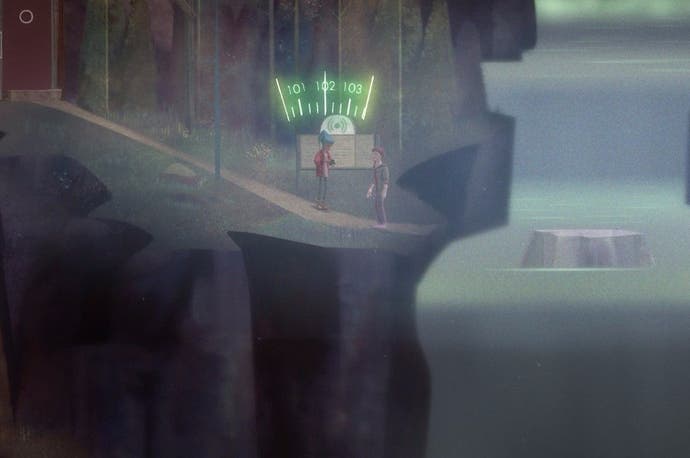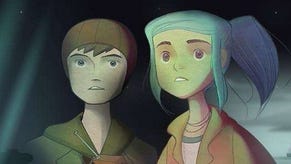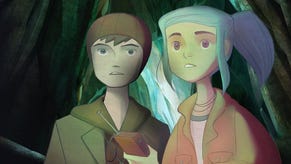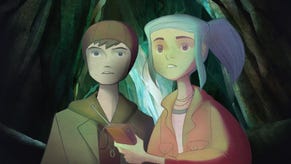Oxenfree review
Talking simulator.
There's a kind of story that campfires were built for. Tales of flickering shadow, told with earnest delight to at least a briefly receptive audience willing to put aside logic and courage, and allowed to simmer in darkness when the light finally expires.
Oxenfree is one of those tales. It's not a scary game, though it's an often unsettling one, rooted in that sense of shared communal unease. The laughter at the scary bits to make it clear how very not scared you are by the things that go bump in the night. The slow, drawn out reveals that hang as much in the silence before the reveal as whatever bogeyman lurks at the heart of the story. The sense of not being alone in the dark, but uniting against the darkness; a group of friends pulling together with humour and warmth that cuts through the spooky atmosphere.
Specifically, it's the story of a small group of teenagers heading out to party on a deserted, abandoned island - a familiar rite of passage on a creepy local landmark, but one where the spooky radio signals in the caves are largely secondary to getting drunk, stoned, and maybe to at least reach second base on the beach. Alex, a slight tomboy considered just one of the guys, Jonas, her new step-brother, Ren, a friend doting after Nona, his latest crush, and Clarissa, the local queen bee. All are there to party, but end up facing far more than just hangovers when Alex inadvertently opens a rift in the caves and, to use the technical phrase, shit gets weird.
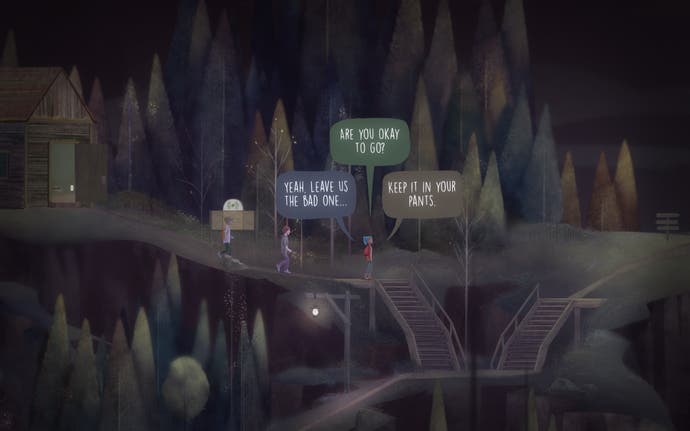
The specifics would be spoilers, but Oxenfree manages to take a plot that's mostly on the Scooby Doo end of the horror scale (minus a last minute reveal and "I would have gotten away with it!") and make it its own. The world is a beautifully painted one of watercolours broken up with spooky effects, a soundscape of old radio stations bleeding into the new, of looped history and surreal encounters that beg questions instead of just foster confusion.
Its main focus though is conversation. There aren't many puzzles, but Alex and friends are always - always - talking. Jokes, swapping theories and bitchy comments, arguing over what to do, discussing their backstories, altering relationships... there are very few moments that don't feel as much like an interactive radio play as a walk around the island. All conversations play out in real-time too, giving very little time to choose your response and no chance for backsies, with your choices ultimately splitting Oxenfree off into multiple endings. It's not a game I felt any need to go back to after the credits rolled, but I did like that they were acknowledged.
Certainly, during that all-important first play, it's very well written and performed stuff. The tone is very natural, with line-deliveries full of pauses and stammers and corrections that really works for the setting, even if it can lean a little too much towards being self-aware when the aforementioned shit gets weird. Much like Life is Strange though, it also falls into a very standard trap. The characters are teenagers, but very obviously written and performed by adults who get very awkward when trying to find a level between reality and stylised Buffyspeak.
This particularly comes out early on with clunky moments like Alex protesting that she's totally cool and hip, which doesn't even work ironically any more, or a character joking that everyone go skinny-dipping and get killed by 'Jason Krueger'. Thud. Instead they decide to play an awkward game called "Truth Or Slap", in a not particularly subtle way to dodge someone having to take their pants off, followed up by, ahem, "Marry, Screw, Kill". Now, swearing may not be big or clever, but sometimes a scene does beg for a quick F-Bomb for veracity and avoidance of eye-rolling. At least this one would be more justified than LIS' infamous "Go f*** your selfie."
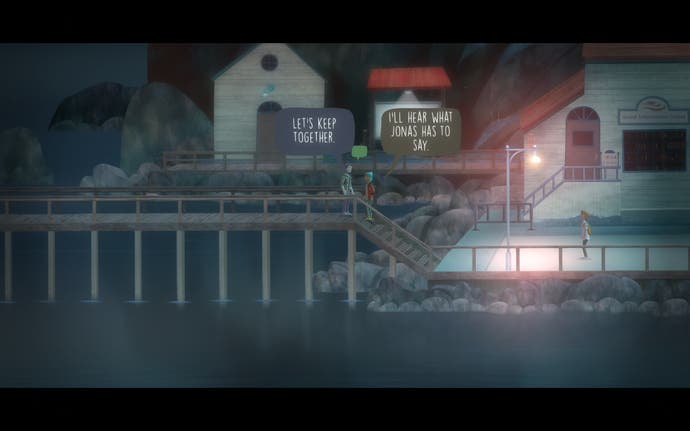
This becomes much less distracting once the story proper kicks off though, with conversations either more personal or more focused on the business in hand - of the story of this deserted island, of the radio stations that speak to its past, and of the strange moments throughout. Alex in particular is prone to moments of deja-joue, where time just resets itself instead of letting her out, only for the reset to throw a few little changes. Her radio becomes a sixth sense, even if what she hears on it is often hard to understand, with the rest of the characters experiencing their own oddities and giving conflicting reports of what's been happening on the island. Again, Oxenfree never becomes outright scary, but it quickly finds a good level of compelling, creepy mystery, with the conversation keeping the action flowing even when just walking about.
The main catch with this is that naturalistic conversations are not something typically games often do well, and Oxenfree is often no exception. You have to choose responses quickly, but often the interruptions come at the wrong time, being less cutting into a conversation as outright silencing the current speaker, or walking too far down a path and over an invisible trigger having them suddenly change tack fast enough to get audible whiplash. It's no worse than any other game and better than most, but few others bet quite so heavily on creating that flow. When it works, it works well. When it breaks down, it's like seeing a hole cut through the world, just as sometimes the need to fill dead-air audibly takes priority over what's actually being said.
Those moments are blessedly rare though, with Oxenfree's general success at creating not just mood but a sense of momentum pivotal to why it works: the intentional slowness, the sudden bursts of action, the sense that if bad things happen, they're happening to friends instead of just to a firing line of horny victims. Even when not much is happening, the inevitability of it hangs over the action, and when things do get real, the acting and design is more than up to the task.
It's not a game for anyone who says phrases like 'walking simulators' with a sneer, nor a slice of horror that's going to leave you up all night. Don't expect puzzles or fast action or hours and hours of adventuring (around 4-5, most likely), and don't expect Oxenfree to apologise for any of that. It knows what it is and it's comfortable with it; to be a slice of intrigue and warmth capable of telling its well-written story without outstaying its welcome, and happy to leave a few moments of its fun night's adventure behind even when nothing remains of the campfire but ash.
